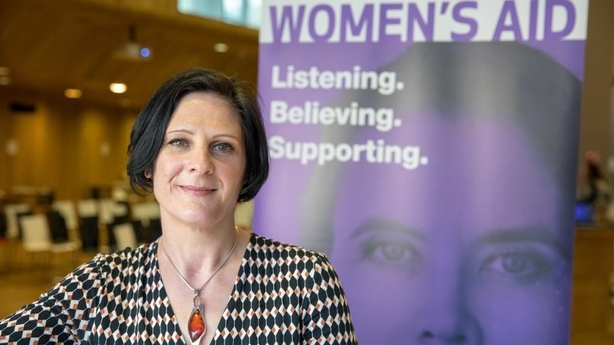The classic early 2000s vampire series Twilight became a romantic benchmark for a generation of young women.
It focused on a young woman who gave up everything and isolated herself from friends and family for a relationship with a hyper-controlling vampire who had an insatiable urge to kill her. A person who literally wanted to consume her. What have we learned since its launch?
Not much, as it is in the early stages of a TV reboot.
But the series is merely a template for so many narratives: be it Fifty Shades of Grey or the After series, the list is endless, but the draconian message is the same - total control over a partner is an act of affection.
For every positive series like Sex Education, there is a sadistic, bloodsucking, millionaire lurking around the corner.
But the unfortunate reality is these relationship dynamics are not a fantasy constructed by the media.
Every day, the sun rises. Every day, people go to work, come home, and eat dinner, and every day over 133 women or girls are killed by a family member.
You might wince at that statistic, and hopefully feel a wave of gratitude that this issue does not affect you. But the sad reality is that around 41% of Irish women know someone who has experienced intimate partner violence, so if you do not think you know someone suffering or who has suffered, you're wrong.
Coercive control is defined as a persistent pattern of controlling, coercive behaviour that includes various types of domestic abuse, like sexual, emotional, and physical abuse perpetrated by an intimate partner. In 2019, coercive control became a criminal offence in Ireland.

new RTÉ podcast Runaway Joe
In 1967, June Maloney died at Rochester State Hospital. Her ex-husband Joe was at her bedside during her short illness. When Joe was arrested for June’s murder, he escaped and went on the lam, he has never stood trial for her death… so far.
The case went dormant until the RTÉ Documentary On One team got involved. Thanks to their recent hit podcast Runaway Joe, new leads have emerged, and co-victims like June’s loved ones and Joe’s children have been given a platform to articulate their trauma.
Moreover, the public has been given an in-depth look at what intimate partner violence really looks like.
We need your consent to load this rte-player contentWe use rte-player to manage extra content that can set cookies on your device and collect data about your activity. Please review their details and accept them to load the content.Manage Preferences
Listen to the first episode of Runaway Joe
According to Detective Superintendent Garda Laura Sweeney, 46% of domestic homicides have a preceding physical assault, but 96% have coercive control.
On TikTok, forms of coercive control like gaslighting, or love bombing regularly crop up, with victims utilising the sound and stitch feature to tell survival stories.
But how many of us can actually define these terms properly? Let alone identify them in a relationship or assist someone trapped in an abusive situation.
Sarah Benson, CEO of Women's Aid, has worked in the domestic and sexual violence sector for over 20 years. She explained what coercive control is, the signs to watch out for and why we must alter our approach to this global epidemic.

It is not about a single action, she explained it is often multiple behaviours that unravel over time.
Controlling characteristics might be monitoring where somebody goes, who they see, and who they talk to all in an effort to reduce the victim's choices and ability to make decisions.
"Coercion could be threats, intimidation, it could even escalate to physical violence, it could include sexual coercion. So, in the law, the behaviour is coercive or controlling. It doesn't have to be both, but very often it is."
With coercive control, warning signs can be disguised as things people consider romantic, such as constant attention or gift-giving.
Victims are pushed to move faster in a relationship than they are comfortable with. They might give up time with friends or agree to engage in certain sexual acts. But, it can escalate to moving in with the person, giving up work or even pregnancy.
Economic abuse is often left out of the conversation, but Ms Benson said it can have a greater impact beyond the control of finances.
She said it can have a domino effect on someone's day-to-day existence, their ability to do things for themselves and critically their ability to exit the relationship: "That is a situation where women are sometimes consciously trading the prospect of absolute poverty for safety."
When an individual has worked to achieve control over their romantic partner, if they think that is going compromised, tactics will frequently escalate, hence, the end of a relationship can be one of the most dangerous times for victims.
Most domestic homicides will occur in the first year of a person having left their abusive relationship, according to Detective Superintendent Garda Laura Sweeney, who was interviewed extensively for the Runaway Joe series.
About a third of people who experience domestic abuse, regardless of age, never tell anybody. If you are reading this and worried about a friend or loved one, Ms Benson said the important thing is to open up the conversation and remember that "You don’t have to be an expert".
She advised people to ask open questions and not to jump straight to solutions or attack the perpetrator. Instead, listen, know what support services are available and crucially believe them.
There are also practical things people can do to assist a person experiencing domestic abuse. If they need to apply for a protective order, you can help confidentially document what is happening. You can keep a safe bag for them as they plan an exit strategy or mind important documents like passports or children's birth certs that could be destroyed.
But she said it is important to always let the victim lead the discussion.
When it comes to warning signs, Ms Benson said to think about someone's personality before and after their relationship began. It could be a loss or spark or a change in dress or appearance.
One of the most obvious signs is that the person will stop making contact. If they attend social events, they might be tense, vigilant with their phone, and make excuses to leave early.
But she said it is best to follow your gut instinct.
No matter what, Ms Benson stressed to "keep the door open." Because a sure way to keep somebody in a coercive relationship is to cut them off.
She added that there is a lack of research on domestic abuse in same-sex relationships, but Women’s Aid is engaging with colleagues who work with LGBTQ+ organisations in Ireland to close this gap.
Ms Benson said there can be very specific dynamics in LGBTQ+ intimate partnerships abuse can be connected to the fact it is a same-sex relationship, or to someone's gender identity. For example, withholding access to hormones or threatening to out somebody.
"What we do know is that in heterosexual relationships the tactics can be the same, we do know that this is overwhelmingly a gendered issue, so it is very disproportionately women who will suffer, but where men do suffer as well, what we do know is that you can certainly have emotional abuse and psychological abuse, even economic abuse."
Where things can differ, she said, is with sexual violence, which is far more prevalent when perpetrated against women. The risk of serious physical harm and death is much higher for women than men in heterosexual relationships.
She added that there is very little research on same-sex relationships for women, but for men in relationships with other men, there can be high levels of sexual abuse, comparable to that of heterosexual women.
Women’s aid will provide support and assistance to anyone who needs help, including men. The charity has a referral process with a male advice line run by the Men’s Development Network and contacts with an LGBTQ+ helpline.
It also has a second website targeted at younger people called toointoyou.ie.
"It does not matter what your gender identity is, it does not matter what your sexuality is - if your partner poses a threat to you, the law covers you in that regard as well."
In 2022 Minister for Justice Helen McEntee introduced a zero-tolerance policy for domestic, sexual and gender-based violence in our communities.
Nothing in the above article suggests this will be easily achieved, no country has been successful in the quest of eradicating domestic abuse thus far. But Ms Benson said she has never seen such momentum for doing better and improving.
If you have been affected by issues raised in this story, please visit www.rte.ie/helplines.


